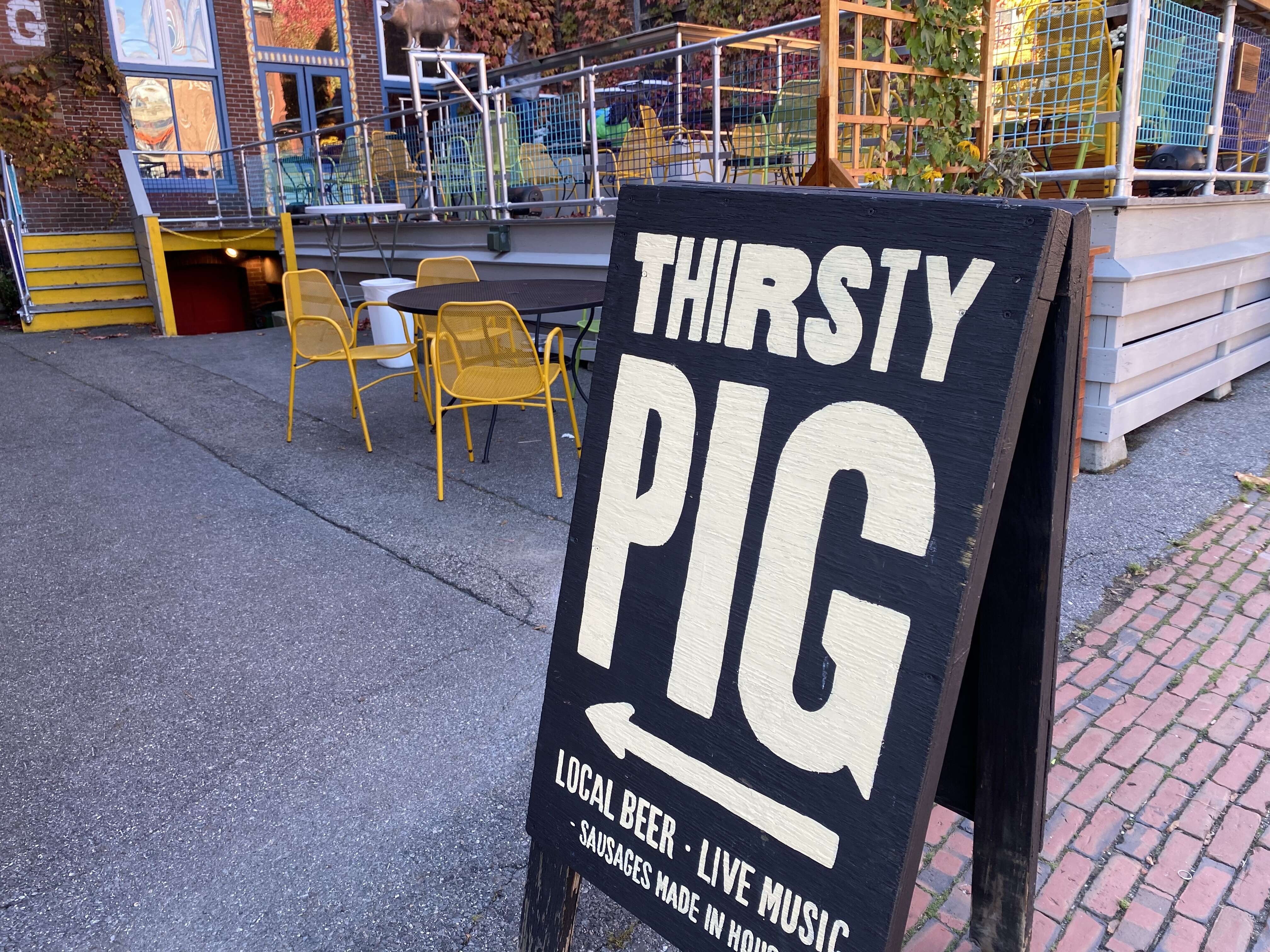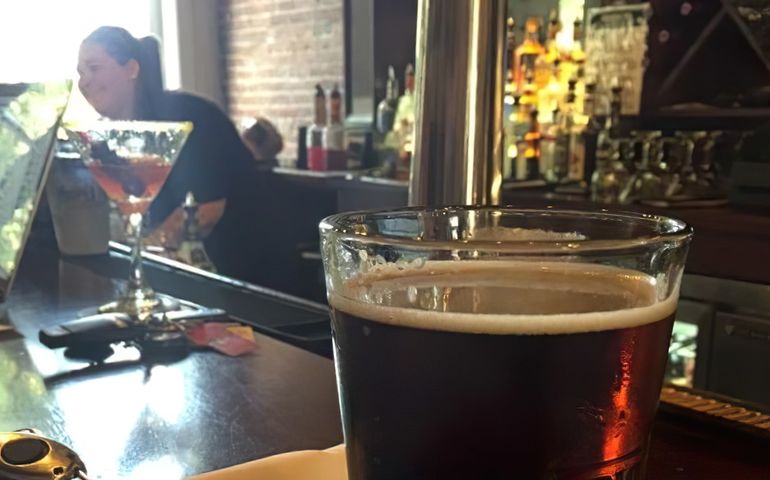
Bar owners and tasting rooms will have to wait to open indoor service
 Photo / Maureen Milliken
Indoor service at bars and tasting rooms has been postponed again, indefinitely, as Maine COVID-19 cases surge.
Photo / Maureen Milliken
Indoor service at bars and tasting rooms has been postponed again, indefinitely, as Maine COVID-19 cases surge.
More Information
Indoor opening for bars and tasting rooms, set for today after being postponed this summer, has been put off indefinitley, as Gov. Janet Mills Sunday took measures to slow the spread of the state's rising COVID-19 caseload.
Indoor gathering limits have also been reduced to a maximum of 50, and New York, New Jersey and Connecticut are off the list of states exempt from testing and quarantines for residents entering Maine.
Indoor service at bars, tasting rooms and distilleries that don't have tables and serve meals, was originally set to open in June, then pushed back and repeatedly delayed as the state tries to get its COVID-19 caseload under control. Health officials say the nature of prolonged, close contact with no face masks makes drinking establishments particularly susceptible to coronavirus spread.
Mills' administration also encouraged employers to allow employees to work remotely whenever possible, and urged Mainers to patronize local businesses by ordering curbside and using delivery services. And the rise in cases and impact on the state's economy, spurred a call from Mills for more federal help for the state's small businesses.
“If we do not control this outbreak, we may never get this evil genie back in the bottle,” Mills said in a Sunday news release. The state's positivity rate — the percentage of tests that are positive — has more than doubled over the last two weeks, to 0.92%.
The Maine trend is part of a nationwide one, where the COVID-19 virus has exploded in most states and many, including New York, Massachussetts, Rhode Island have clampled down in an attempt to slow it.
Mills said last week the state would try not to further restrict businesses despite the rise in cases, but the trend became too serious. "We cannot in good conscience proceed with the planned reopening," she said Sunday. “To the business owners and employees of bars and tasting rooms, I am deeply sorry that we have been forced to make this decision to postpone your reopening."
She said she knows business owners were "ready and willing to follow public health guidance to keep yourselves and Maine people safe. We realize that this decision will cause hardship."
“My administration will continue to do all we can to support Maine’s small businesses and hardworking families through these challenging times, and will continue to seek further financial relief from Congress for Maine businesses who have lost so much already," she said. Mills has repeatedly said the state's businesses need federal help to recover from the effect of shutdowns necessary to protect public health and further economic impact.
Heather Johnson, commissioner of the Department of Economic and Community Development, said, the state will continue to try to find creative ways to support businesses and their employees.
Maine is experiencing widespread "community transmission," Nirav Shah, director of the Maine Center for Disease Control and Prevention, said in Sunday's news release. He said last week that means that people in all sorts of settings are spreading the virus, rather than it coming from larger outbreaks at places like nursing homes and shelters, as it was in the spring.
Many of the recent cases are coming from family and friend gatherings, or people going to restaurants and not wearing masks, he said.

Bars, tasting rooms 'raise health concerns'
With the rising number of cases "and scientific evidence that the unique environment of bars, including enclosed spaces where people gather with members outside their own household while talking loudly and not wearing face coverings, elevates the risk of COVID-19 transmission," the release said.
Shah said in June, when bar opens were initially pushed back, that the two main factors of COVID-19 transmission are duration and density of exposure. "Bars raise significant health concerns on both fronts," he said.
Those that serve food and have sit-down service at tables can be open under the same gathering limits, which is back to 50 people, that restaurants come under.
"Maine brewers are ready to serve patrons safely, following all COVID-19 guidelines, as soon as we're able to reopen," Sean Sullivan, executive director of the Maine Brewers Guild, told Mainebiz. "We understand the governor is making difficult decisions and public safety is the top priority. We are hopeful all Mainers can work to stop the spread of the virus so we can get back to business.
"In the meantime, Maine brewers will remain open for curbside takeout, contactless service, and outdoor tastings when and where they are allowed to do so, and we appreciate Mainers ongoing support for local beer," Sullivan said.
Indoor gathering limits reduced
The state's priority is to encourage voluntary compliance with public health and safety measures, the release said. But the administration is also taking measures to reduce large gatherings, a primary concern of public health experts
'Effective Wednesday, indoor gatherings will return to a maximum of 50 people, regardless of capacity. Less than a month ago, as Maine's positivity rate consistently hovered around 0.42, the indoor gathering limit was raised from 50 to half of capacity, with a 100 person limit.
Outdoor limits are still 100, and that includes for restaurants, bars and tasting rooms. That allowance comes with a requirement of physical distancing and the use of face coverings.
Occupancy limits for retail businesses remain at five people per 1,000 square feet of shopping space.
States no longer exempt
Effective Wednesday, people coming to Maine from from New York, New Jersey and Connecticut — states with recent high virus increases — will have to either show proof of a negative COVID-19 test taken within 72 hours of arrival, or quarantine for 14 days once they get here while awaiting test results.
This includes Maine residents returning from one of the non-exempt states. It's also the case for all other states, except those still on the exempt list: Massachusetts, New Hampshire and Vermont. State health officials, though, are "closely evaluating public health metrics" in Massachusetts and it may come off the exempt list if trends don't improve, Mills said.
Limiting visits from out-of-staters has been a concern of retail and hospitality industry officials, because of the state's year-round dependence on tourist money.
Keep Maine Healthy continues
Mills said that the majority of Maine’s economy is still open, but that means it's critical that people take steps to protect themselves, their businesses and others
“In order to keep schools open as much as possible, in order to keep our economy rolling, it is more important than ever before that each of us avoids gatherings, stays six feet apart from other people, uses hand sanitizer, gets a flu shot, wears a face covering indoors and outdoors, and washes our hands frequently,” Mills said. “Maine people recognize that this is a fundamental matter of social and personal responsibility — like not driving on the wrong side of the road, like putting your young child in a car seat, like wearing a coat in cold weather.”
The administration will extend the Keep Maine Healthy program through December to promote local prevention efforts, which includes more than $13 million in federal CARES ACT funding to 132 municipalities and two tribal governments to develop and implement COVID-19 prevention, education and protection plans.














0 Comments